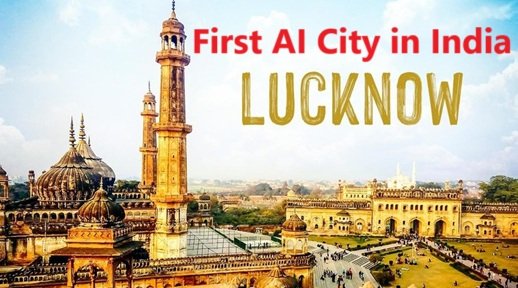India, one of the fastest-growing technology hubs in the world, is embarking on a groundbreaking project that will reshape its future. This new development, the “First AI City in India,” promises to be a catalyst for innovation, technological advancements, and an exciting leap towards modern urbanization. With AI (Artificial Intelligence) taking center stage in almost every sector, this city will serve as a model for integrating AI into daily life, from urban planning to transportation and healthcare.
In this comprehensive guide, we will delve into the details of India’s first AI city, exploring the vision behind it, the technological aspects, key components, and the expected impact on India and the global tech landscape. Additionally, we’ll explore the city’s features in-depth, with insights into its development, goals, and its potential to pave the way for future AI-driven cities.
What Is the First AI City in India?
India’s first AI city is not just a physical space; it is a revolutionary project that aims to integrate artificial intelligence with urban planning, infrastructure, and services. The city will be developed with AI at its core, making it the first of its kind in India, where AI will drive daily operations, enhance efficiency, and create an ecosystem where technological innovation thrives.
The project is expected to be a blend of cutting-edge technology and modern urbanism. The AI city will focus on using artificial intelligence in various sectors such as healthcare, education, transportation, energy management, and more. The idea is to make daily life more efficient, sustainable, and smart by leveraging AI solutions.
Key Features of the First AI City in India
-
Smart Infrastructure: The city will be equipped with advanced AI systems that will manage everything from traffic to energy usage. Sensors, machine learning algorithms, and IoT (Internet of Things) devices will power this infrastructure, making the city adaptive and responsive.
-
Sustainable Development: Sustainability is at the core of the AI city’s development. From renewable energy solutions to smart water and waste management systems, the city will use AI to optimize resource usage and minimize environmental impact.
-
Healthcare Innovation: The AI city will use artificial intelligence to enhance healthcare services. From predictive healthcare systems to personalized medicine, AI will play a central role in providing better healthcare outcomes.
-
Urban Mobility: AI-powered transportation systems will revolutionize urban mobility in the AI city. Self-driving vehicles, autonomous buses, and smart traffic management systems will help reduce traffic congestion and pollution.
-
Education and Research: AI technologies will enhance educational experiences. The AI city will have AI-driven learning platforms and research institutions focusing on the development of AI technologies and solutions.
Why Is India Building Its First AI City?
India’s growing tech ecosystem, backed by a large population and a digital-first approach, makes it an ideal candidate for such a transformative project. There are several reasons behind the creation of India’s first AI city:
1. Accelerating Technological Growth
Artificial Intelligence is already having a profound impact on industries like finance, healthcare, education, and transportation. The AI city is an attempt to accelerate this growth, providing a platform where AI can be developed and tested at a city-wide scale.
2. Promoting Innovation and Research
The AI city will serve as a research hub, attracting global tech companies, startups, and research institutions to develop the next-generation AI solutions. It will create a collaborative environment where innovation is at the forefront.
3. Creating Smart Urban Infrastructure
As India faces rapid urbanization, there is an urgent need for smarter, more sustainable cities. AI will help optimize the use of resources, improve efficiency, and make urban spaces more livable and sustainable.
4. Improving Quality of Life
AI can significantly improve the quality of life by offering personalized services in healthcare, transportation, and public safety. The city will use AI to make day-to-day life more convenient and less stressful.
5. Boosting Economic Growth
By creating an ecosystem where AI technology is nurtured, the AI city will generate job opportunities, attract investments, and contribute to the overall economic growth of the region.
The Location of India’s First AI City
The location of India’s first AI city is strategically chosen to ensure that it becomes a hub of technology and innovation. The city is being developed in Udhampur, a region that has been selected for its strategic location and the potential to transform into an AI-powered smart city.
Udhampur is well-connected by road, rail, and air, providing easy access to key cities in India. Its proximity to major tech hubs like Bengaluru, Hyderabad, and Delhi also makes it an ideal location for establishing the first AI city.
Components of the First AI City
The city will feature a wide array of AI-driven systems and infrastructure. Some of the key components of the AI city are as follows:
1. AI-Powered Infrastructure
The AI city will have smart infrastructure that includes AI-powered buildings, roads, traffic management systems, and energy solutions. This will help in reducing resource consumption, minimizing waste, and improving the overall quality of life.
2. AI in Transportation
AI will be used to revolutionize transportation in the city. Self-driving cars, buses, and taxis will be a common sight. These vehicles will be equipped with sensors and AI systems that allow them to communicate with each other and traffic infrastructure to optimize routes and minimize congestion.
3. AI in Healthcare
Healthcare systems in the city will be enhanced by AI. From robotic surgeries to AI-driven diagnostics and patient monitoring, the AI city will lead the way in innovative healthcare solutions.
4. AI-Enabled Security
Security in the AI city will be managed through AI systems that use surveillance cameras, facial recognition, and predictive algorithms to prevent crime and ensure the safety of its residents.
5. AI in Energy Management
AI will play a pivotal role in optimizing energy consumption in the city. Smart grids and AI-powered energy management systems will ensure that energy is used efficiently and sustainably.
How AI Is Shaping the Future of Cities
The development of the AI city is not just about creating a high-tech space but about showcasing how AI can transform urban living. Below are some ways AI is shaping the future of cities:
- Smart Waste Management: AI can optimize waste collection and recycling, reducing costs and environmental impact.
- Predictive Policing: AI algorithms can predict where crimes are likely to occur, helping law enforcement agencies deploy resources more efficiently.
- Intelligent Traffic Systems: AI can monitor traffic in real-time and adjust signals and routes to reduce congestion.
- Energy Efficiency: Smart grids and energy management systems can help cities reduce their carbon footprint by optimizing energy usage.
Potential Challenges and Risks
While the AI city promises great benefits, there are potential challenges and risks that need to be addressed:
-
Privacy Concerns: With extensive surveillance and data collection, there may be concerns about privacy and the potential misuse of data.
-
Cybersecurity: The interconnectedness of AI systems poses a significant cybersecurity risk. Protecting data and infrastructure from cyberattacks will be crucial.
-
Economic Displacement: The introduction of AI may lead to job displacement in some sectors. Addressing the skills gap and retraining workers will be important to mitigate this risk.
-
Social Inequality: If AI is not implemented inclusively, there could be a widening gap between different socio-economic groups in terms of access to technology and services.
The Future of AI Cities in India
India’s first AI city is just the beginning of a larger trend towards AI-powered urbanization. As cities grow and technological advancements continue, more AI cities are expected to emerge. These cities will serve as models for integrating AI into everyday life, creating smarter, more sustainable, and more efficient urban spaces.
Table: Key Features of India’s First AI City
| Feature | Description |
|---|---|
| Location | Udhampur, India |
| Core Technology | Artificial Intelligence (AI) |
| Primary Focus | Smart infrastructure, healthcare, transportation, energy management |
| Key Components | AI-powered buildings, self-driving cars, AI-enhanced healthcare, smart grids |
| Sustainability | Smart waste management, renewable energy solutions, water management |
| Healthcare Innovations | AI-driven diagnostics, robotic surgery, personalized medicine |
| Urban Mobility | Self-driving cars, AI-powered buses, smart traffic systems |
| Expected Impact | Increased efficiency, reduced environmental impact, improved quality of life |
Conclusion
The first AI city in India represents a bold step forward in the country’s technological and urban development journey. It is a visionary project that promises to reshape how cities operate, how people live, and how technology can be harnessed to improve quality of life.
By integrating AI into every aspect of urban life, the city will not only serve as a model for other Indian cities but also inspire the global tech community. The success of this project will likely lead to the development of many more AI-driven cities, ultimately transforming urbanization on a global scale.
As we look towards the future, the AI city stands as a beacon of innovation, sustainability, and human progress. It is a glimpse into what the cities of tomorrow could look like — smart, efficient, and powered by cutting-edge technology.
Read More: Droxy AI: Revolutionizing AI Technology for Business Automation


